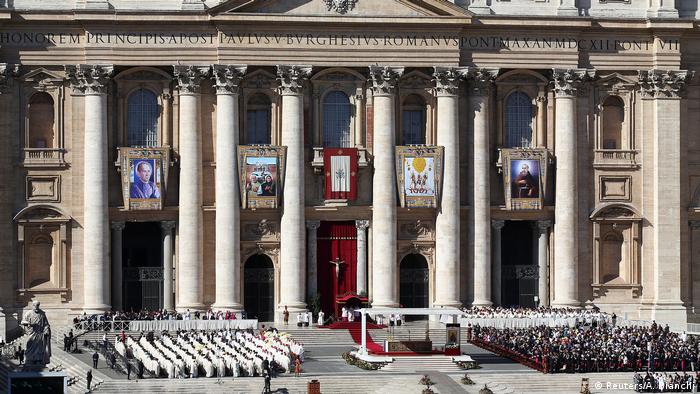Pope Francis canonizes 35 new saints
Since Francis became pope in 2013 he has often honored Christians who have suffered for their faith in current times. He emphasized that the latest saints can serve as role models for today's Catholics.
The Catholic Church has 35 new saints, almost all of them martyrs from centuries past, after Pope Francis canonized them during Sunday Mass in St. Peter's Square.
The Mass was attended by about 35,000 pilgrims, many of them came from the homelands of those being honored.
Francis elevated 30 martyrs Dutch Calvinists in Brazil persecuted in 1645.
In the 1520s, three indigenous children, aged between 12 and 13 were also made said. They were of the Talaxcaltec people, an indigenous pre-Colombian group in what is now Mexico, were martyred in Mexico after refusing to return to their ancient traditions and insisted on maintaining their Catholic faith.
The two other new saints were an Italian priest who died in 1739 and a 20th-century priest from Spain.
In the four-plus years of his papacy, Francis has frequently honored Christians who have suffered or died for their faith in current times, particularly in the Middle East.
At the conclusion of Sunday's canonization ceremony Francis lauded the new saints as "shining witnesses to the Gospel."
Francis calls synod
In recent times, the Vatican has emphasized that the latest saints can serve as role models for today's Catholics.
Francis used Sunday's event to announce that he will call a meeting of bishops, or synod, from countries in the Pan-Amazon region for October 2019. They will discuss the condition of the Church Catholic in the area and the plight of indigenous people.
The region includes Guyana, Suriname, French Guyana, Venezuela, Ecuador, Colombia, Bolivia, Peru and Brazil.
Francis, who was born in Argentina and is the first pope to come from Latin America, frequently, links his calls for social justice, especially for indigenous people, to those for the defense of the environment, noting that the poor will suffer the most from the consequences of climate change.
He wrote a landmark encyclical, or papal letter, in defense of the environment in 2015 and he has called for special protection for the Amazon region because of its vital role in the planet's ecosystem.
During his comments Sunday, the pontiff did not mention the role of the church in suppressing native cultures in the New World.
But in 2015, during a visit to Bolivia, Francis said, "Many grave sins were committed against the native people of America in the name of God." He asked forgiveness for the church, for "crimes committed against native peoples during the so-called conquest of America."
bik/sms (AP, Reuters)
The Mass was attended by about 35,000 pilgrims, many of them came from the homelands of those being honored.
Francis elevated 30 martyrs Dutch Calvinists in Brazil persecuted in 1645.
In the 1520s, three indigenous children, aged between 12 and 13 were also made said. They were of the Talaxcaltec people, an indigenous pre-Colombian group in what is now Mexico, were martyred in Mexico after refusing to return to their ancient traditions and insisted on maintaining their Catholic faith.
The two other new saints were an Italian priest who died in 1739 and a 20th-century priest from Spain.
In the four-plus years of his papacy, Francis has frequently honored Christians who have suffered or died for their faith in current times, particularly in the Middle East.
At the conclusion of Sunday's canonization ceremony Francis lauded the new saints as "shining witnesses to the Gospel."
Francis calls synod
In recent times, the Vatican has emphasized that the latest saints can serve as role models for today's Catholics.
Francis used Sunday's event to announce that he will call a meeting of bishops, or synod, from countries in the Pan-Amazon region for October 2019. They will discuss the condition of the Church Catholic in the area and the plight of indigenous people.
The region includes Guyana, Suriname, French Guyana, Venezuela, Ecuador, Colombia, Bolivia, Peru and Brazil.
Francis, who was born in Argentina and is the first pope to come from Latin America, frequently, links his calls for social justice, especially for indigenous people, to those for the defense of the environment, noting that the poor will suffer the most from the consequences of climate change.
He wrote a landmark encyclical, or papal letter, in defense of the environment in 2015 and he has called for special protection for the Amazon region because of its vital role in the planet's ecosystem.
During his comments Sunday, the pontiff did not mention the role of the church in suppressing native cultures in the New World.
But in 2015, during a visit to Bolivia, Francis said, "Many grave sins were committed against the native people of America in the name of God." He asked forgiveness for the church, for "crimes committed against native peoples during the so-called conquest of America."
bik/sms (AP, Reuters)


No comments:
Post a Comment